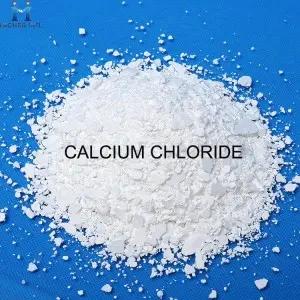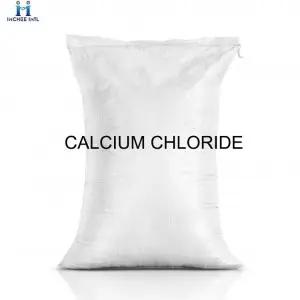Calcium chloride is a chemical composed of chloride and calcium elements. The chemical formula is CACL2, which is slightly bitter. It is a typical ion -type halide, with white, hard pieces or particles at room temperature. Its common applications include saline, road melting agents and desiccants used in refrigeration equipment.

Calcium chloride from the appearance is mainly divided into liquid calcium chloride and solid calcium chloride. Liquid calcium chloride is an aqueous solution of calcium chloride, the general content of calcium chloride is 27~42%. If the content of calcium chloride is too high, the solution will be too viscous, the temperature decreases the solution solidification, there are transportation, unloading, use difficulties and other problems. Solid calcium chloride can be divided into flake, ball, powder and other three, its composition is divided into calcium chloride dihydrate or anhydrous calcium chloride. The content of calcium chloride in calcium chloride dihydrate is generally 72~78%, and the content of calcium chloride in anhydrous calcium chloride is more than 90% or 94% (mainly spherical calcium).
Generally speaking, the production process of spherical calcium is complicated, the process stability is not high, the operating parameters are strict, the production energy consumption is a little high, but its products have the advantages of beautiful appearance, good fluidity of Chemicalbook, no dust, no caking, not easy to absorb moisture, so the sales price of spherical calcium calcium chloride is higher than flake or powder calcium chloride, mainly used for household desiccant, export For snow and ice melting agent. By grade, calcium chloride can be divided into industrial grade calcium chloride and food grade calcium chloride. Compared with industrial grade calcium chloride, food grade calcium chloride has stricter requirements on production control and higher product purity. The national standards have added indicators such as color, heavy metal (lead, arsenic) and fluorine content of products. Food grade calcium chloride can be used as stabilizer, solidifying agent, thickening agent, nutritive fortifying agent, desiccant, etc., its range of use includes bean products, thin cream, soft drinks, sweet sauce, jam, mixing water and food industry processing aid.
Main applications:
Calcium chloride is made up of chlorine and calcium and has the chemical formula CaCl2. It is a typical ionic halide, white solid at room temperature and neutral in aqueous solution. Calcium chloride, its hydrates and solutions have important applications in food manufacturing, building materials, medicine and biology.
Industrial use
1, used as a multi-purpose desiccant, such as nitrogen, oxygen, hydrogen, hydrogen chloride, sulfur dioxide and other gases drying. Used as dehydrating agent in the production of alcohols, esters, ethers and acrylics. Calcium chloride aqueous solution is an important refrigerant for refrigerating machine and ice making. It can accelerate the hardening of concrete and increase the cold resistance of building mortar. It is an excellent building antifreeze agent. Used as port antifogging agent and road dust collector, fabric fire retardant agent. Used as a protective agent and refining agent for aluminum magnesium metallurgy. It is a precipitator for the production of lake pigments. Used for deinking waste paper processing. It is the raw material for the production of calcium salts.
2. Chelating agent; Curing agent; Calcium fortifier; Refrigerating refrigerant; Desiccant; Anticoagulant; Microbiotics; Pickling agent; Tissue improvers.
3, used as desiccant, road dust collecting agent, fogging agent, fabric fire retardant, food preservatives and used in the manufacture of calcium salt.
4, used as lubricating oil additive.
5, used as an analytical reagent.
6. It is mainly used for the treatment of tetany, urticaria, exusive edema, intestinal and ureteral colic, magnesium poisoning and so on caused by the decrease of blood calcium.
7, used in the food industry as calcium fortifying agent, curing agent, chelating agent and desiccant.
8, can increase the permeability of bacterial cell wall.
Food use
1. Calcium chloride can be added to foods as a calcium enhancer, or as a coagulant for tofu and cheese.
2. Calcium chloride can be added to alcoholic and cool drinks to regulate the PH and hardness of the drinks.
3. Used in the food industry as calcium fortifying agent, curing agent, chelating agent and desiccant.
4. It can increase the permeability of bacterial cell wall.
5. The dissolving and exothermic properties of calcium chloride lead to its use in self-heating cans and heating pads.
Preparation method:
1.Calcium chloride dihydrate (dehydration method) method:
The edible anhydrous calcium chloride product was prepared by drying and dehydrating calcium chloride dihydrate at 200 ~ 300℃.
The chemical reaction equation is as follows:
For neutral calcium chloride solution, spray drying tower can be used at 300℃ hot gas flow for spray drying dehydration, to prepare anhydrous calcium chloride powder finished products.
2.Spray drying and dewatering method:
The refined neutral calcium chloride solution, which has removed arsenic and heavy metals, is sprayed into mist form above the spray drying tower through the nozzle, and countercurrent contact with 300℃ hot gas flow to dry and dehydrate, and then powdered anhydrous calcium chloride is obtained to prepare edible anhydrous calcium chloride products.
3. Mother liquor method:
An aqueous solution is obtained by adding lime milk to the mother liquor in the process of soda ash by ammonia alkali method, which is formed by evaporation, concentration, cooling and solidification.
4. Compound decomposition method:
It is produced by the action of calcium carbonate (limestone) with hydrochloric acid.
Chemical reaction equation: CaCO3+2HCl=CaCl2+H2O+CO2↑.
After the above steps are completed, the heat is heated to 260 degrees Celsius, evaporation and dehydration.
5.Refining method:
The by-product in the production of sodium hypochlorite is refined.
A by-product of the Solvay process for the preparation of sodium carbonate.
Ca(OH)2 + 2NH4Cl → CaCl2 + 2NH3 + 2H2O
Operation precautions:
Closed operation to enhance ventilation. Operators must be specially trained and strictly abide by operating procedures. It is recommended that operators wear self-priming filter dust masks to avoid dust. When handling, light loading and unloading should be done to prevent damage to packaging and containers.
Storage precautions:
Store in a cool, ventilated warehouse. Packing containers must be sealed and protected from moisture. Store separately from deliquious items.
Product packaging: 25KG/BAG

Post time: Apr-12-2023






